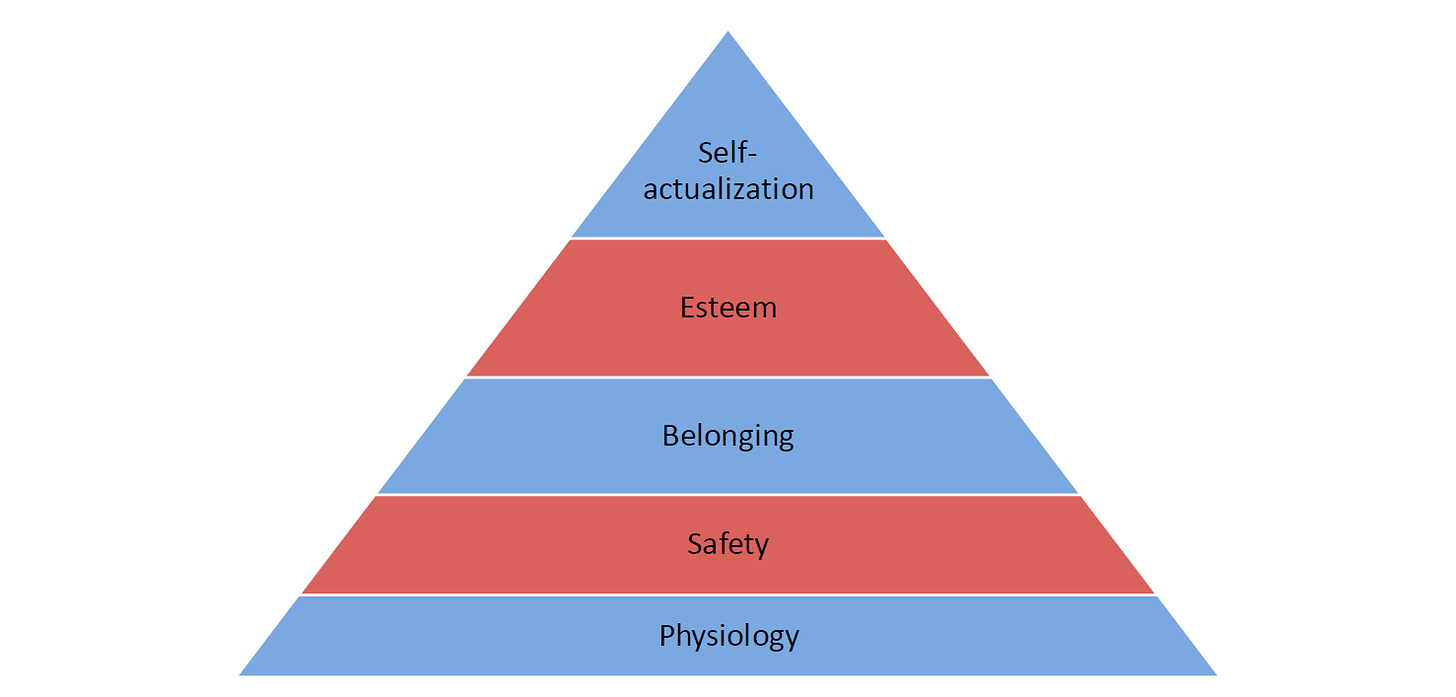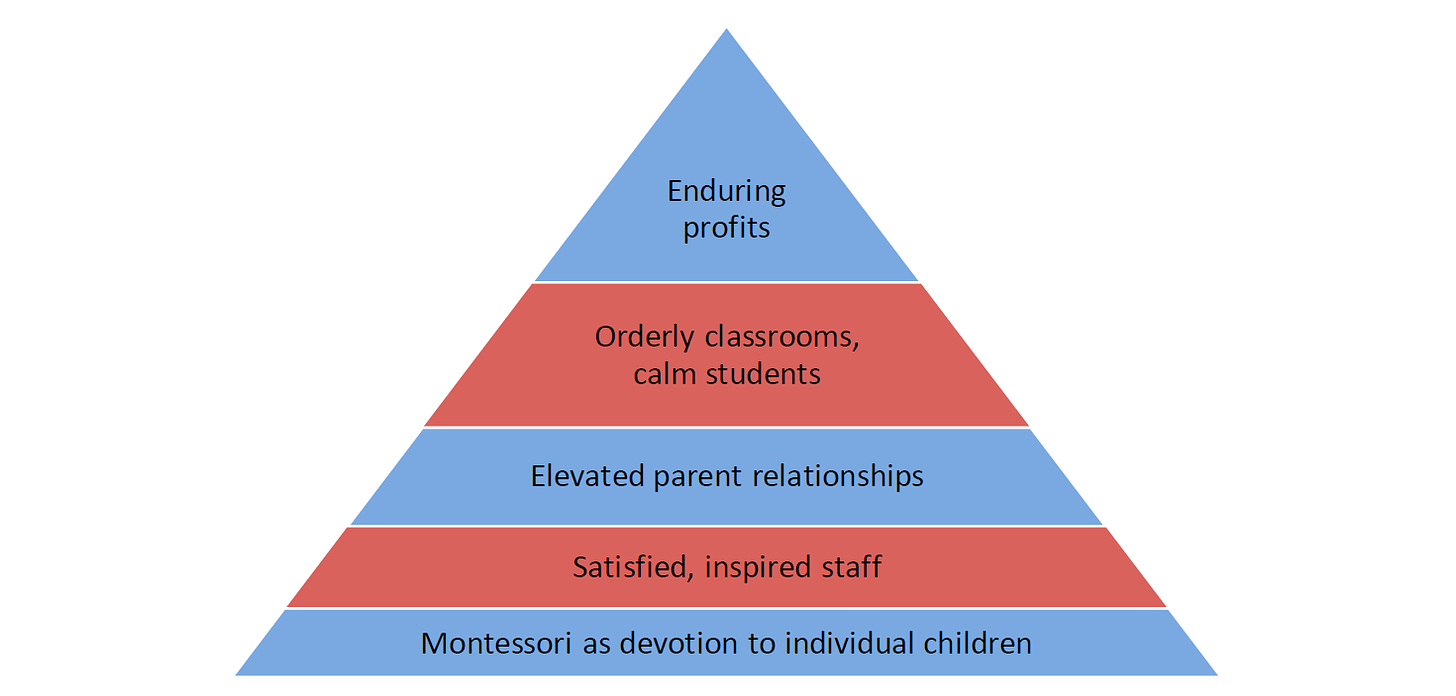

Discover more from Higher Ground's Friday Notes
Happy Friday, everyone.
This is Maslow’s hierarchy of needs. You’re probably familiar with the basic idea even if you’ve never seen it before.
At the bottom are physiological and physical needs—food, health, basic material wellbeing. Knowing you’ll have a roof over your head. At the top are things like creativity, meaning, self-actualization. In the middle are things like feeling accomplished, and having a sense of belonging.
The idea is that there’s a certain structure, a certain order to human needs. You can’t just go straight for creativity and self-actualization. You can’t even start with belonging. You need to start at the foundation: with basic physical needs. Before you can create great art, you have to eat. Before you can reflect on the meaning of life, you have to get shelter from the storm. Only if you have basic material security can you start to find work and relationships that offer self-esteem. And only once you have those can you start to think about the higher joys of meaning and reflection that realize your full potential.
I think this is probably familiar to you. My experience has been that it resonates with many people.
Maslow’s hierarchy is about the motivation of an individual, considering the whole range of their needs and possible motives as a human being. But it can be thought to apply analogously to different areas of life. Marriages, businesses, cities, or, say, schools.
What might a Maslow’s hierarchy look like for our schools?
The idea, again, is that the stuff at the bottom of the pyramid has to be established first. There’s an order to these things. And, again, I imagine this will resonate with many of you.
Sometimes it can feel like you absolutely need to prioritize the bottom half of this. You need to focus on the very basics of classroom routine and coverage before you can’t even get to the top bits, the great Montessori and the happiness with your own work. That you are eager to do more and be more, but are in survival mode or basics mode, needing to scrape by until things are more stable. That you have to tough it out and push through to earn the right to focus on achieving the deep meaning of the educational mission.
I think this idea, that you have to start by meeting basic needs, and only after achieving them can you pursue higher needs, is plausible, and I’m sympathetic to those who desire to order things in this way. But I also think that it’s completely wrong.
Not just sort of right and sort of wrong. Not something that’s got a kernel of truth and that we should be sympathetic to. As I said, I’m very sympathetic to people that feel this way or think this is true, but the view itself is wrong, really wrong, wrong wrong.
The truth is, inverting this hierarchy would be much closer to right.
At the bottom, as the first and most basic need, is a community rallied around excellent, elevated Montessori in service of children. That’s the basis. That’s the foundation. That’s the ground on which everything else is built. That is the “why”, the beating heart of each and every school and of our network as a whole, and it comes first.
Even if you haven’t achieved it yet, you can see it. The North Star guides all decisions. It is a vision that infuses everything. The end is very literally the beginning.
To achieve that end, the next thing you need to think about is staff. Specifically, guides: each guide’s understanding and buy-in on the mission, and ability to make it real. You also have to think about parents, and how to inspire them to embrace the Montessori perspective that the human child is a self-creator. All of this has to add up and gel into an aligned community. A school community that at least glimpses the vision, that is excited about the potential of the school for unlocking the potential of children, that is full of people who are holding one another to that insanely high standard.
That, in turn, is how you start to achieve—quickly—classroom excellence, which gives you the orderliness and happiness of your students. Classroom excellence is achieved only by inspired, missionary educators.
And, ultimately, this is what gives a school financial health. Enduring profits are the measure of successful value creation.
I said that inverting this hierarchy is “closer” to right. It’s not actually right, since the ordering isn’t really chronological. This sort of hierarchy is a nesting of wholes and parts, not a sequence in time.
In terms of sequencing things in time, you have to do all of these things at once. You have to make them all an expression of the same forward motion. Indeed, one of the reasons why the mission is so fundamental is that the only way you will ever accomplish all of these things at once. The mission is a perspective on all of it. We are here to serve growing human beings and believe that we know a great way to do so. This infuses every choice and action with its full, inspired meaning, and rallies a team.
Each of these things is integrated, and they together form an inseparable whole. It’s not a first A then B type of situation, it’s more like A is a part of B. Financial health and scheduling need to be pursued simultaneously to a mission-orientation—because they are indeed part of what it means to achieve the mission. They are literally part of elevated Montessori, in the same way that the functioning circulatory system is part of an elevated individual life.
Let me make the point more forcefully.
There is no such thing as bare survival. There is no such thing as “just getting by” in life. The only path to survival, to getting the basics in order, is pursuing the whole thing. And in practice, that means pursuing excellence.
There is only one way to succeed: being mission-focused. And there is only one way to be mission-focused: to pursue excellence in action. Operational excellence, programmatic excellence, community excellence. Excellence about tactics, strategy, and mission. Excellence first, excellence last, excellence always. Part of the function of the mission is to be the thing that justifies, demands, and inspires excellence.
Impassioned excellence cannot wait. Yes, you may not always get there right away, but if you’re postponing it for the sake of survival, if your survival strategy is anything other than fully pursuing the ideal, you’re actually withering. In the context of a school, if the purpose is to achieve an impassioned, elevated ideal—if that’s nominally what you’re surviving for the sake of—no other motive is sustainable. That ideal cannot wait. And the longer it waits, the less credible it seems. You think you’re surviving to fight another day, but you don’t notice the ideal diminishing, your self-trust diminishing, and cynicism encroaching.
Missionary excellence—above all, as manifest in exceptional program quality—is the only effective motive. It is the only sustainable motive. You start by aiming high. Being directly motivated by excellence is the only thing that will ever get you excellence.
The foregoing is part of a talk (here lightly modified) that I recently gave to school leaders on excellence. Next week I’ll send along another excerpt, the conclusion of the talk, on how the very idea of excellence is core to our pedagogy and our view of human life and development.
Ray Girn
Founder and CEO, Higher Ground Education
Subscribe to Higher Ground's Friday Notes
Broadcasting the weekly internal memos of Higher Ground Education















I had a lot to say but I would like to share a story first…The title of the story is
MUDA
The Taj hotel had invites Mr Masi Imani from Japan to hold to hold a workshop for its staff.
The staff was very sceptical.this person from Japan has no exposure to the hotel industry.-what exactly is he going to teach?
But everyone gathered as planned for the workshop in the conference hall sharp at 9 am.
Mr Masi was introduced to them- a not so impressive personality, nor the English that good, spoke rather clumsy English.
“ Good morning! Let’s start work. I am told this is workshop; but I see neither work nor shop? So let’s proceed where the work is happening. Let’s start from the first floor”.
Everyone trooped out of the conference room after Me Masai.
The first floor happened to be the laundry room of the hotel.
Mr Masi entered the room ,stood near the window,” beautiful view” he said.
Staff knew this they did not need Japanese consultant to tell them.
“ A room with such a beautiful view is wasted as laundry room. Shift the laundry to the basement and convert this into a guest room”.
Ha! No one had thought of that!
The manager said that can be done.
“ Then let’s do it,” Mr Masai said.
“ Yes sir, I will make a note of this and we will include it in the report of the workshop that will be prepared,” said the manager.
“Excuse me there is nothing to report on this or make notes. Let’s just do it”, just now.” Mr. Masai.
“ just now”? Manager.
“Yes, decide on the area in the basement or ground floor and move things it will take couple of hours right ? - Mr Masai.
“Yes” - Manager.
Let’s meet at lunch then and from today you can start earning a couple of thousands that you charge your customers for a night.
“Now let’s move to the pantry”. The group entered there were 2 sinks full of dirty plates.
Mr Masai removed his jacket and started washing the plates.” Sir please what are you doing”?Manager was shocked!
“I am washing plates because that’s what sink is for ,there are racks for dirty dishes.”
After finishing the job he asked “how many plates do you have “?
“Plenty so that there would not be any shortage “- Manager
Mr Masai said,” we have a word in Japanese- ‘Muda’! MUDA means delay, unnecessary spending. One lesson to learn in this workshop is to avoid both. If you have plenty of plates there will be delay in cleaning them. Remove the excess.
“ we will write this in our report “- Manager.
“ No , wasting our time in making repots is another MUDA.
Let us pack the extra plates and send them to other locations that need them.
On the last day he told them a story , a Japanese and an American both fond of hunting met in a jungle, they entered the deep jungle and realized they have ran out of the bullets.
Suddenly they heard a roar of a lion.
Both started running but then Japanese took a short break to wear his shoes. American exclaimed that they need to reach the car first. No said Japanese I just need to be ahead of you.
All the participants engrossed in the story suddenly realized that lion would stop after getting his victim!
“ The lesson is: competition in the world is so fierce, that it is important to stay ahead of others, even by couple is steps.And you have such well endowed country. If you remember to curtail your expenditure, get experienced staff and your policies right you will be miles ahead.
Achieve some perfection [excellence] yourself, so that you may not fall into sorrow by seeing the perfection in others.
- RUMI-